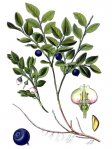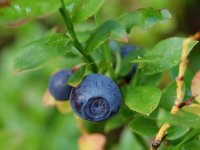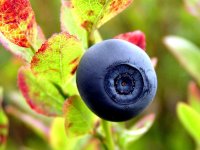Blueberry - vaccinium myrtillus
Other names: Bilberry myrtles, bilberry, blackberry, blackberry, blueberry, black.
Family Heather (Ericaceae).
Botanical characteristics. Low branched perennial shrub in height of 15-40 cm, branches are glabrous, branched, sharply bristled. Leaves almost sessile, spirally located, solid, elliptical or ovate-elliptical, marginal small. Leaves on the top are sharp, pale from below, from above - light green, glabrous, thin, fall to winter. Flowers are regular, on short pedicels, single, in axils of leaves. Corolla of flowers greenish-white with a pinkish tinge, spherical. Fruit is a globular black berry. Blossoms in May - June, fruits ripen in July.
Spread. Blueberry is a moisture-loving plant. In Belarus and in the central part of Russia it grows everywhere in pine and mixed forests, among bushes, in shaded, marshy places. The plant requires careful treatment, especially given its medicinal and nutritional value.
Chemical composition. Bilberry leaves are rich in inulin, flavonoids, anthocyanins. Fruits contain carbohydrates (glucose, sucrose, fructose, pectin), organic acids (citric, lactic, oxalic, malic, amber), vitamins C, B19, B2, P, PP, carotene, high amounts of flavonoids, phenolic acids (cinchona, Coffee, chlorogenic), tannins, essential oil, manganese and iron compounds.
Used parts of the plant. For medicinal purposes, fruits and leaves of blueberry are used. Leaves harvested during the flowering of the plant and during the maturity of the fruit. The berries are harvested in a period of full maturity. Dried fruits of bilberry release pharmacies. Bilberry leaves are included in the collection for patients with diabetes mellitus called Arfazetin.
Application in medicine
Bilberry is known in folk medicine as a plant that enhances the body's immunity, its resistance to stress, as a restorative, sugar reducing, anti-inflammatory, hemostatic, hematopoietic, vasodilator, astringent, choleretic, diuretic.
Fresh berries have a slight laxative effect, they activate intestinal peristalsis, which is important for chronic constipation, as well as diabetes, gout, rheumatism. Kissel and infusion of blueberries, especially dry berries, is useful as an astringent for diarrhea , as well as for bed wetting , for patients with anemia and anemia, for dysentery.
Scientific and traditional medicine recognized the sugar-reducing effect of blueberry leaves. Lotions from the decoction of fresh berries or ointment of them with fresh cream or Provencal oil are applied to areas of the body with disorders of the skin, with pustular skin diseases, eczema, with allergic rashes. Decoction from the plant is used for uterine bleeding, dropsy, cholelithiasis, kidney stones.
Blueberry berries are considered a means for preventing tumor processes. Consuming them also helps improve vision.
A mixture of berries and blueberries juice rinse the throat, mouth cavity in angina , inflammatory processes, with diseases of the upper respiratory tract, in particular, with laryngitis.
Natural fresh juice or gruel from berries is applied to eczematous areas, to the skin with psoriatic plaques, with scabies, burns, ulcers, acne, diathesis.
When skin lesions take a bath, applying as raw materials for infusion of leaves of blueberries in a mixture with field horsetail, oat straw, grass turn.
Preparation
- Infusion of bilberry leaves: 1 tbsp. L. Raw pour 1 cup of boiling water and insist 30 minutes, filter. Take 0.5 cup 3 times daily before meals with diabetes, inflammatory processes in the kidneys, atony of the bladder, intestinal colic.
- Broth from the leaves of blueberry ordinary: 1 tbsp. L. Dry leaves pour 1 glass of water and boil for 3 minutes. Insist for 30 minutes and filter. Take 0.5 cup 3 times daily before meals with diabetes, allergies, inflammatory processes in the kidneys.
- Cold infusion of bilberry fruits: 2 tbsp. L. Dry fruits pour 1 cup of cold boiled water and insist 8 hours, filter. Drink 0.5 cup 3 - 4 times a day for hypovitaminosis, periodontitis, diarrhea, dysentery.
- Hot infusion of bilberry fruits: 2 tbsp. L. Fruits are poured with 2 cups of boiling water and insist in a thermos for 4 hours, filter. Drink 0.5 cup 3 - 4 times a day with anemia, after radiation damage, with fatigue, diabetes.
- Bilberry wine: 1 tbsp. L. Dried fruit is poured into 150 ml of water and boiled for 20 minutes. Add 250 ml of red wine and the mixture is boiled for another 10 minutes. Take 1 tbsp. L. 3 times a day for chronic colitis.
- Broth leaves of blueberry ordinary: 3 tbsp. L. Dry leaves of blueberry pour 1 liter of water and boil for 5 minutes, and then insist 30 minutes. Used for syringing with whites and inflammatory processes of the female sexual sphere or used for enemas with hemorrhoidal inflammations.





Comments
When commenting on, remember that the content and tone of your message can hurt the feelings of real people, show respect and tolerance to your interlocutors even if you do not share their opinion, your behavior in the conditions of freedom of expression and anonymity provided by the Internet, changes Not only virtual, but also the real world. All comments are hidden from the index, spam is controlled.